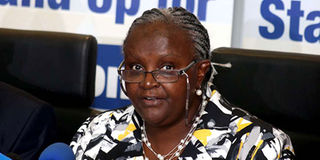UN set to review Kenya’s human rights record

Ms Kagwiria Mbogori, the chairperson of the Kenya National Commission on Human Right, which has criticised security forces for perpetuating rights violations, holds a press conference in Nairobi on August 16, 2017. PHOTO | FILE | NATION MEDIA GROUP
What you need to know:
- Independent monitoring groups generally acknowledge some improvements in Kenya's human rights situation but also point to continuing abuses.
- Journalists in Kenya face dangers in carrying out their professional duties, Human Rights Watch notes in its report to the UN council.
NEW YORK
Kenya is this month scheduled to undergo a wide-ranging United Nations review of its human rights record, with government officials set to spar with critics on issues such as police behaviour, corruption and gender-based violence.
The UN Human Rights Council will conduct the interactive assessment as part of its periodic reviews of all countries' respect for internationally-agreed rights.
This will be the third time the council has considered Kenya's human rights performance since the UN General Assembly initiated the process of “universal periodic reviews” in 2006.
Council member-states will focus particularly on Kenya's success in implementing a total of 192 recommendations resulting from the most recent periodic review in 2015.
In documents prepared in advance of the scheduled session on January 22 in Geneva, the government highlights many reforms it has undertaken.
POLICE TRAINING
Several independent monitoring groups, in their own presentations to the council, generally acknowledge some improvements in Kenya's human rights situation but also point to continuing abuses.
In regard to policing, for example, the government's submission for the forthcoming review cites “radical changes” made to the police force in 2018.
“Training on human rights is an integral component of the police curriculum,” states Kenya's national report to the UN body.
“The police are expected to use the knowledge gained from the training to effectively protect and respect human rights as they go about their work of maintaining law and order.”
“All allegations of extrajudicial killing by law enforcement officers are promptly investigated and perpetrators brought to justice to ensure accountability,” the government's report adds.
POOR LAW ENFORCEMENT
The Kenya National Commission on Human Right notes the importance of these initiatives but says the security forces often engage in human rights violations.
“The commission continued to receive complaints of unlawful torture, killings, disappearances and sexual violence,” the rights group declared in its submission to the UN council.
Official handling of cases of sexual- and gender-based violence is generally “poor”, the commission finds.
Laws go unenforced while segments of Kenya's justice system fail to coordinate their responses to violence directed at women.
There is also a lack of government-sponsored safe houses for victims of abuse, the commission says.
The Federation of Women Lawyers in Kenya along with two other NGOs deplores in a joint statement “an increase in the number of women killed on account of their gender”.
ECONOMIC CRIMES
The groups attribute this development to the “'normalisation' of violence against women propagated in social media and other public spaces”.
On corruption, the government tells the UN council of efforts to combat illicit financial flows, tax avoidance and low-level graft.
A collaborative approach involving laws, policy and institutional actions has proved “highly successful”, the government says.
It points to the arraignment in court of “several high-ranking government officials on corruption, abuses of office and money-laundering charges”.
Stolen assets and unpaid taxes totalling Sh5.5 billion have been recovered or assessed in recent years as part of its anti-corruption campaign, the government states.
While commending these steps, the rights commission warns that graft remains widespread in the form of “bribes or unlawful facilitation fees to obtain and hasten government services” at the national and county levels.
PRESS FREEDOM
Journalists in Kenya face dangers in carrying out their professional duties, Human Rights Watch notes in its report to the UN council.
“Despite numerous public promises by President Kenyatta to safeguard press freedom, police and senior state officials attacked and threatened journalists writing on 'sensitive issues' such as elections, land, corruption and security,” the New York-based NGO states.
Monitoring groups based in Kampala and London meanwhile express concern in a joint statement regarding the Kenyan government's use of biometric databases.
Collection of personal information can increase in the absence of privacy-protection legislation, the groups warn.
The government does admit to a few shortcomings in protecting Kenyans' rights.
After the January 22 review session, the UN council will issue an outcome report summarising the discussion involving the Kenyan government and its interlocutors.





